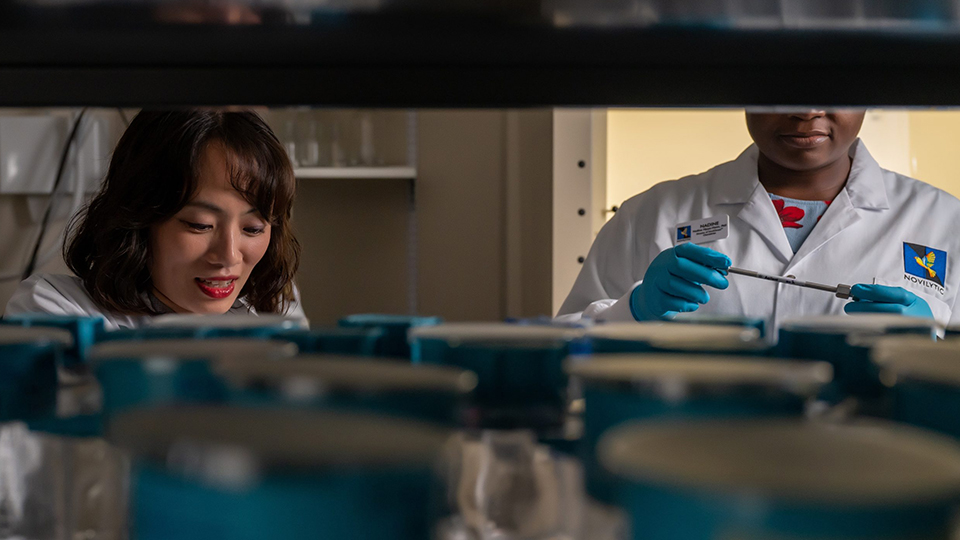Novilytic secures $1.6M, preps commercial launch
Subscriber Benefit
As a subscriber you can listen to articles at work, in the car, or while you work out. Subscribe Now
Boosted by a recent $1.6 million seed round, West Lafayette-based startup Novilytic will be testing its technology in the coming weeks with major pharmaceutical companies in the U.S.—a final step before the commercial launch, planned for early 2023. The young company says its product gives pharmaceutical companies a tool they’ve never had before: a real-time watchdog on alert for contamination during a critical part of the drug-making process. Novilytic Chief Executive Officer Paul Dreier says the tool could save a pharmaceutical company $20 million—the cost of trashing a single batch of drugs once contaminated.
A crucial part of the drug-making process is putting all the starting organisms into a container called a bioreactor, also known as fermentor; Dreier likens the process to fermenting beer, because “you begin with a bunch of starting materials, you cook it, and out comes drugs at the other end—just like in a beer fermenter.”
Similar to how canaries were historically used in coal mines to alert miners if dangerous gases were present, Novilytic’s tool—called “the canary in the fermentor” in marketing materials—detects in real-time if there are poisons or contamination in pharmaceutical fermentors that could ruin an entire batch of drugs.
“Currently, pharma companies don’t have a way to measure in real-time whether or not those poisons are developing,” says Dreier. “It takes them about eight hours to do that, and a normal batch of pharmaceuticals takes 14 days to manufacture. If we can tell them what’s going on in real-time, they can make adjustments and make drugs less expensively.”
The tool, called The Proteometer, is designed specifically for monoclonal antibody bioreactors. While monoclonal antibody-based medicines received much notoriety during the pandemic—Indianapolis-based Eli Lilly and Co. makes the leading Covid-19 antibody treatment—the class of drugs is used to treat many diseases, including some types of cancer.
“Forty to 60% of the cost of goods sold to make [monoclonal antibody therapies] is used in purifying them, because [pharmaceutical companies] cannot control the contamination right now, and our technology will fix that,” says Dreier.
Based at the Purdue Research Park, the startup also manufactures the liquid solutions, or chemical reagents, that are used to detect the contamination. Novilytic says if a bioreactor is producing some type of contamination, and it ferments for the standard eight hours, it will typically take three to four days to clean the contamination out of the bioreactor.
“[Our tool] can save that time, and each of those days is worth about $200,000. If that batch becomes too contaminated and is waste [as a result], it will save the pharmaceutical company $20 million,” says Dreier. “So it’s a huge savings we can provide, and we can alert them now in real-time—you can’t do that now without our product.”
The $1.6 million in seed funding will support hiring an additional 20 employees and launching The Proteometer into the marketplace. Dreier believes, boosted by sales, Novilytic will likely create 50 jobs in about two years. “We’d rather it be 100 or 200, which I think we can do,” he says.
Dreier emphasizes that Indiana is the ideal place to launch and nurture Novilytic; he says the state is “the home of analytical chemistry” with three of the top five analytic chemistry programs in the country at Hoosier universities.
“In Indiana, we also have five of the top 20 analytical chemists in the whole world, as voted by their peers,” says Dreier. “[We’ve taken our technology] and grown it here instead of taking it outside of our state…there are only a few companies that have stayed here to do that. One of them is Roche Diagnostics, and the other one’s Cook. We want to do the same thing, and I think we can keep the technology here in Indiana.”
While Novilytic’s first product is focused on the monoclonal antibody space—a $500 million market, Dreier says—there are “a whole host of other applications in protein-based chemistry” equally large for its technology.
“There are great things here in Indiana…Roche and Cook…we should all as Hoosiers be very proud of that,” says Dreier. “It’s so geeky to be in love with analytical chemistry, but it means so much to the world, and Indiana brings that here and produces a heck of a lot of jobs because of it.”
Dreier says the seed funding lays the foundation for the startup to grow “very, very quickly” and create even more jobs than projected.
Dreier says the addition of more facilities is on the horizon, and the startup plans to manufacture in Indiana.
